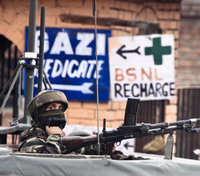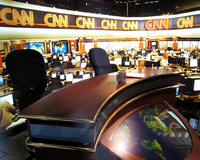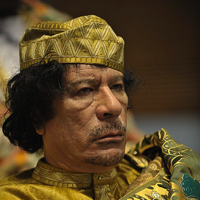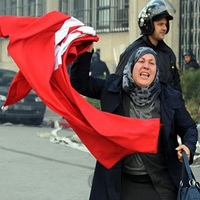Over the weekend, Chinese Premier Wen Jiabao offered a glimpse into China’s apprehension toward the popular uprisings in the Arab world when he rejected comparisons between China and the Middle East. “We have followed closely the turbulence in some north African and Middle Eastern countries,” said Wen, according to the Associated Press. “We believe it is not right to draw an analogy between China and those countries.” His remarks coincided with two worthy op-eds in the U.S. media questioning the likelihood that unrest may spread to China. “The communist government in Beijing is clearly worried,” wrote Francis Fukuyama in the […]
Human Rights Archive
Free Newsletter

India has vehemently opposed the imposition of a no-fly zone in strife-torn Libya. Though New Delhi supported U.N. Security Council Resolution 1970, authorizing ecomonic sanctions against Col. Moammar Gadhafi and referring Libya to the International Criminal Court, India has made it clear that it stands against any kind of military intervention in the troubled state. However, New Delhi’s aversion to intervention is far from consistent: When it comes to South Asia, in particular, intervention in the internal matters of other states has long been part and parcel of India’s foreign policy. In 1971, India fought a war with Pakistan and […]

The CNN effect is alive and well in 2011, even if its 2.0 incarnation might now be labeled the Al-Jazeera effect. The fact that U.S. President Barack Obama and British Prime Minister David Cameron are now talking about a “full spectrum of possible responses” to support the opposition to Libyan leader Moammar Gadhafi and NATO is considering endorsing a “no-fly zone” over the embattled North African state — even as the war in Afghanistan rages and Iraq is far from settled — testifies to the ongoing power of the global media to drive even a superpower’s foreign policy agenda. But […]
To be clearer about what I had in mind when I wrote yesterday that the U.S. should be preparing military options for Libya, I think the no-fly zone is a red herring. It’s essentially shorthand for, “Do something, but make sure it’s sanitized so there are no messy consequences.” The problem is that it won’t be sanitized, and it’s unlikely to have a significant impact. It also requires an ongoing operation and commitment of resources. If we are going to make that kind of extended commitment, it should be in terms of logistical support — humanitarian, organizational and military — […]

When Libyan leader Moammar Gadhafi reacted to popular demonstrations by shooting protesters, he triggered a torrent of international condemnation. Gadhafi and his harsh crackdown became the target of pointed denunciations by the international community and by top government officials on every continent. There was, however, one region where Gadhafi found words of support from a number of powerful leaders: Latin America. The reaction to events in Libya and other Middle Eastern country from leftist leaders in Latin America says much about their worldview, about the way they define themselves and about their commitment to their political principles. Consider Nicaraguan President […]
I have to admit that I have been very tempted by the argument — best expressed, to my mind, by Thomas P.M. Barnett, here and here — that the U.S. should take some sort of military action to make sure that Moammar Gadhafi does not hold onto power in Libya. The idea that there are no American interests at stake is based on such a narrow definition of American interests that I find it not very compelling at all. And the calls for restraint, while sound as a guide to U.S. policy in general, seem strikingly out of place here. […]
I had the pleasure of taking part in France 24’s panel discussion program, The World This Week, on Friday. The other guests were Matthew Saltmarsh of the IHT, Billie O’Kadameri of Radio France International and Simon Kuper of Financial Times. The discussion focused on events in Libya, but we also covered Ivory Coast and the resignations of former French Foreign Minister Michele Alliot-Marie and former German Defense Minister Karl-Theodore zu Guttenberg. Part one can be found here. Part two can be found here. I recommend the discussion on Libya in particular, because Billie O’Kadameri offered some very useful insights into […]

In November 2010, the Saudi monarch, King Abdullah bin Abd al-Aziz, traveled to the United States for medical treatment, touching off rounds of fevered speculation about the prospects for succession in Saudi Arabia. Crown Prince Sultan bin Abd al-Aziz’s own frail health and recent convalescence in Morocco gave the speculation further life. Of course, due to the royal family’s opaque approach to the issue, discussions of the internal rivalries that are reputed to divide the royal family are often based on mere conjecture. With little concrete information upon which to ground analysis, each decision of the royal family is then […]

History demonstrates that revolutions often result in new or renewed forms of despotism. One reason for caution regarding the future of the Arab Uprising is that few Middle Eastern countries have political pasts not dominated by monarchy, theocracy or the military. So previous rebellions ultimately enhanced rather than mitigated socio-political intolerance. After all, Iran’s activist mullahs and al-Qaida’s founders were the products of rebellions against monarchist totalitarianism, too. It remains to be seen whether Egypt will become more democratic or return to military rule, or if the turbulence of the post-Mubarak period will open the door for the Muslim Brotherhood […]

Unlike the successful uprisings in neighboring Tunisia and Egypt, characterized by largely unarmed protests and government crackdowns with tear gas and bullets, Libya is now in the midst of a full-bore violent civil war. Refusing to stand down, Col. Moammar Gadhafi has vowed “to fight until the last man and last woman to defend Libya from east to west, north to south.” While rebel forces have taken control of many town and cities, forces loyal to Gadhafi firmly control Tripoli, the country’s capital, and have started to contest the rebels’ control of strategic town and cities over the past week. […]

Historians will eventually gain a fuller understanding of the forces that propelled the 2011 Arab Rebellion and of the changes that made decades of pent-up anti-government rage explode at precisely this moment. But just two months into the still-spreading uprising, we already know some of the important factors motivating protesters. We have also seen the range of responses the protests have elicited from the various Middle Eastern governments facing mass calls for the end of their entrenched regimes. What we have learned so far suggests that the revolution, like a wildfire on wind-whipped dry brush, will continue to spread. And […]
In Islamabad gunmen have shot dead Pakistan’s Minister for Minorities. Shabaz Bhatti, the only Christian in the government cabinet, was murdered on Wednesday in the gun attack on his car. The Pakistani Taliban have claimed responsibility for the killing, calling Bhatti a blasphemer. He had been calling for changes to the country’s blasphemy law under which anyone who speaks ill of Islam can face the death penalty.
